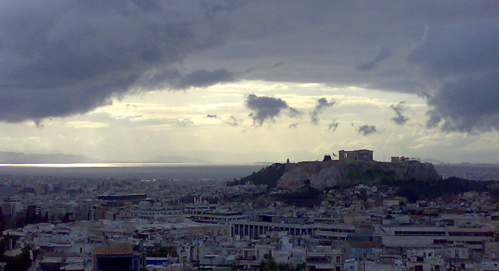Of Vistas and Subordination
I have spent a wonderful if exhausting week conducting workshops in Athens for a client. Wonderful in two main respects – one was the joy of working with switched-on, interested, critical and learning-hungry participants, who were also just plain nice people. In parallel with that, my hotel is the mountainside St George Lycabettus hotel, with my room (and the rooftop breakfast room) facing southwest towards the bowl of the city and the Acropolis. The view is stunning.
It has also been a strange week. Athens has to be one of the most beautiful cities in the world, not so much because of its urban detail, but in the singularity of how the Acropolis dominates it (seen from my mountainside perch) as it laps against its mountainous bowl by the sea.
Athens was one of the most influential cradles of European civilisation. That ancient past lives on in both civilised and uncivilised ways. Athens still harbours that most ancient form of classical politics, the frenzied mob. Yesterday afternoon during the workshop we contemplated for a while the possibility of having to evacuate our building, when the French Institute just a couple of blocks away was wrecked with sledgehammers and petrol bombed by the anarchists.
The Acropolis itself, the symbol of Athenian grace and memory, also harbours contradictions and ambiguities. You can’t decide when looking at it whether it floats serenely above the city or is locked firmly into its rocky heart, subordinating its surroundings to an anonymous white rash of concrete. My favourite poem from Wallace Stevens comes to mind:
I placed a jar in Tennessee,
And round it was, upon a hill.
It made the slovenly wilderness
Surround that hill.
The wilderness rose up to it,
And sprawled around, no longer wild.
The jar was round upon the ground
And tall and of a port in air.
It took dominion everywhere.
The jar was gray and bare.
It did not give of bird or bush,
Like nothing else in Tennessee.
The Acropolis has held many meanings, from fortified citadel, to religious and political centre, to distant and superior seat of authority and power. In many ways, you might say, the present frustrations in Greece, now finding expression through mob violence, come from a sense of a governmental power that sits aloof and unresponsive above the needs and wants of a stressed populace. Looking out over the city the other day, the silent Acropolis still dominated the cityscape on a beautiful day, the riots that were happening in the city invisible save for the cues given by the waspish, hovering police helicopters.
I find that puzzling and disturbing in many ways, not least because the practice of KM often feels like urban, street-level politics, while its aspirations are lofty, serene and Acropolitan. How do the two levels of activity get resolved into a single identity? For now, however, the temptation of the vista is too strong. It’s a lovely sunny day, I’m going to climb the mountain next to me and see if I can get an even better view.

2 Comments so far
- Roger MLM Leads
That is truly an amazing view, I had no idea that Athens look like that, and it was totally different in my imagination. I guess that if you are assigned to work in a place like this, you can easily combine business with pleasure. In fact, I don’t know how you can look out the window and still think about working.
Page 1 of 1 pages
Comment Guidelines: Basic XHTML is allowed (<strong>, <em>, <a>) Line breaks and paragraphs are automatically generated. URLs are automatically converted into links.

Hi Patrick
Indeed, the first time I saw the Acropolis, I was rather perturbed. It appeared so aloof, isolated and failing to “communicate architecturally” with the surrounding modern environment. I was an architecture student then, young, idealistic with high expectations (and without much vision and the benefit of life experience). Later, I discovered from friends and tutors that the Greek government did try to resolve the concern by making it a requirement for the surrounding buildings to be painted only with approved light colours. Would doing something to the external façade resolve the concern, or could there something deeper and profound that need to be addressed?
Likewise in KM, I think the ability to communicate is important. KM projects, for example, are unlikely to succeed if knowledge managers fail to communicate their aspirations and listen to stakeholders to address their needs and concern at various levels. And communication works two ways. Not only that, I think communication needs to be done with ease and comfort, either way.
Well, nevertheless, I must say that Athens is simply lovely and awesome, especially when one gets to view it from the Acropolis itself. I still keep the half- page travel article on Athens that I wrote in the local papers, many, many years ago. Perhaps, I will visit Athens again another time.
Ainah
Posted on January 10, 2009 at 12:50 PM | Comment permalink